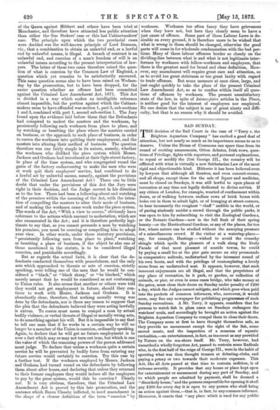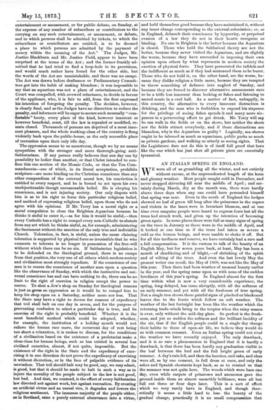SAD SUNDAY.
THE decision of the Bail Court in the ease of "Terry v. the Brighton Aquarium Company" has excited a good deal of attention, but not nearly so much as its importance seems to us to deserve. Unless the House of Commons can spare time from its round of exciting amusements, Ofton debates, Irish rows, ques- tions of Privilege, fights with reporters, and personal explanations, to repeal or modify the 21st George HI., the country will be afflicted with what is virtually a new Sabbatarian Law of the most rigid and objectionable kind. Hitherto it has been believed even by lawyers that although all theatres, and even concert-rooms, and all shops, except those for the sale of liquor and medicine, must be closed on Sundays, it was still lawful to open places of recreation at any time not legally dedicated to divine auricle. If any citizen of London, for example, wearied of confinement within doors, or of walking between endless rows of brick boxes with holes cut in them to admit light, or of lounging at street-corners, to hear incessantly the roughest " chaff " audible in the world, or of pacing aimlessly amidst a crowd through the public parks, it was open to him by subscribing to visit the Zoological Gardens, or the Botanic Gardens—now in the full flush of their spring beauty—or the Horticultural Gardens, or any of the places, far too few, where nature can be studied without the annoying pressure of a miscellaneous crowd. If the visitor at a watering-place---- say, for example, Hastings — wished to avoid the crunchy shingle which spoils the pleasure of a walk along the lively Parade of that most pleasant of seaside towns, he could by paying a small fee at the pier gate secure an airy promenade in comparative solitude, undisturbed by the, inbeasant sound of his own boots, and with the privilege of contemplating a lovely scene from an undisturbed seat. It appears, however, that such innocent enjoyments are all illegal, and that the proprietors of any place of recreation, be it park, or garden, or collection of animals, or pier, or even in some cases bridge, who take money at the gates, must close their doors on Sunday under penalty of £200 a day, which the Judges cannot mitigate, and which goes when paid into the pockets of common informers, who, moreover, it would seem, may fine any newspaper for publishing programmes of such Sunday recreations. A Mr. Terry, it appears, considers that for persons to watch fish in glass cases on Sundays endangers the watchers' souls, and accordingly he brought an action against the Brighton Aquarium Company to compel them to close their doors. The Company seem at first to have thought themselves safe, as they provide no amusement except the sight of the fish, some sacred music, and the inspection of a museum of aquatic curiosities,—an entertainment, in fact, as innocent as any provided by Nature on the sea-shore itself. Mr. Terry, however, had unearthed a wholly forgotten Act, passed to restrain some Radicals who, in the first half of the reign of George Ill., were in the habit of spouting what was then thought treason at debating-clubs, and paying a penny or two towards their moderate expenses. This Act, like all Acts passed at that time to restrain sedition,- is of extreme severity. It provides that any house or place kept open for entertainment or amusement during any part of Sunday, and to which people are admitted by payment, shall be deemed a "disorderly house," and the persons responsible for opening it shall pay 1200 for every day it is open to any person who shall bring an action against them,—that is, in fact, to any commoninfortner. Moreover, it enacts that "any place which is used for any public
entertainment or amusement, or for public debate, on Sunday, at the expense of any number of subscribers or contributors to the carrying on any such entertainment, or amusement, or debate, and to which persons shall be admitted by tickets, to which the subscribers or contributors are entitled, is to be deemed a place to which persons are admitted by the payment of money within the meaning of the Act." The Judges, Mr. Justice Blackburn and Mr. Justice Field, appear to have been surprised at the terms of the Act ; and the former frankly ad- mitted that he had tried to find a loop-hole in its provisions, and would much rather have found for the other side, but the words of the Act are unmistakable, and there was no escape. The Act was drawn before draftsmen or Parliamentary Commit- tees got into the habit of making blunders ; it was impossible to say that an aquarium was not a place of entertainment, and the Court was compelled, with avowed reluctance, to decide in favour of the applicant, who, it is fair to add, from the first expressed his intention of foregoing the penalty. The decision, however, is clearly final, and as the Judges have no discretion to reduce the penalty, and informers will be eager to secure such unusually "com- fortable" booty, every place of the kind, however innocent or however beneficial, must, till the law is repealed or modified, re- main closed. Thousands of persons are deprived of a most inno- cent pleasure, and the whole working-class of the country is flung violently back upon the public-house, as the only accessible place of recreation upon their only idle day.
The oppression seems to us monstrous, though we by no means sympathise with the stronger and more thorough-going anti- Sabbatarians. If any person really believes that one day can by possibility be holier than another, or that Christ intended to con- firm this one section of the Mosaic Code, or that the Ten Com- mandments—one of which, in its literal acceptation, prohibits sculpture—are more binding on the Christian conscience than any other compendium of the external moral law, his conviction is entitled to every respect, and he is bound to act upon his own unobjectionable though unreasonable belief. He is obeying his conscience, and is not injuring society. Our only dispute with him is as to his right to force this particular religious belief, and method of expressing religious belief, upon those who do not agree with his opinions. If Mr. Terry has a moral right or a moral compulsion to close the Brighton Aquarium because he thinks it sinful to enter it,—as for him it would be sinful,—then every Catholic has a right to compel every non-Catholic to abstain from any act which he thinks sinful, as, for example, administering the Sacrament without the sanction of the only true and indivisible Church. Toleration, in fact, is sinful, unless the cause claiming toleration is supported by physical force so irresistible that he who consents to tolerate is no longer in possession of the free-will without which there can be no sin. If Sabbatarian legislation is to be defended on the theological ground, there is no escape from that position, the very one of all others which modern society and civilisation most strongly repudiate. If the conscience of one man is to coerce the conscience of another man upon a question like the observance of Sunday, with which the instinctive and uni- versal conscience has and can have nothing to do, there can be no limit to the right of coercion in religion except the power to coerce. To shut a Jew's shop on Sunday for theological reasons is just as gross an oppression as it would be to compel him to keep his shop open on a Saturday, neither more nor less. That the State may have a right to decree for reasons of expediency that toil shall halt on one day in seven, and for the purpose of preventing confusion to select a particular day is true, and its exercise of the right is probably beneficial. Whether it is the most beneficial method which could be adopted, whether, for example, the institution of a holiday month would not relieve the human race more, the recurrent day of rest being too short a relaxation, it is useless to discuss, for the conditions of a civilisation based on the existence of a proletariat make a close-time for human beings, such as has existed in several less civilised countries, almost, if not quite, impossible. But the
existence of the right in the State and the expediency of exer- cising it in one direction do not prove the expediency of exercising
it without discretion, or in the face of palpable evidence of its
unwisdom. That toil should halt may be good, nay, we may admit, is good, but that it should be made to halt in such a way as to injure the morality of the people subject to the law is not good, but bad. And that, we contend, is the effect of every Sabbatarian law directed not against work, but against recreation. By creating an artificial virtue and an unreal vice, it degrades and lowers the religions sentiment The immense majority of the people either, as in Scotland, raise a purely external observance into a virtue, and hold themselves good because they have maintained it, without any inner change corresponding to the external submission; or, as in England, debauch their consciences by hypocrisy, or perpetual evasion of a law they do not in their hearts recognise as binding. No one in Brighton is the better because the Aquarium is closed. Those who hold the Sabbatical theory are not the better, because they never visited the Aquarium, and are slightly the worse, because they have succeeded in imposing their own opinion upon others by what represents in modern society the exertion of physical force. They have persecuted the infidels and the indifferent as much as if they had sentenced them to be burnt. Those -who do not hold it, on the other hand, are the worse, be- cause they dislike religion a little more, because they are tempted to throw something of defiance into neglect of Sunday, and because they are forced to discover alternative amusements sure to be a trifle less innocent than looking at fishes and listening to sacred music in a cool hall. As a matter of fact, unhappily, in this country, the alternative to every innocent distraction is drinking, and the man who is forbidden to expend his sixpence for the privilege of seeing fishes spends it and many more six- pences in a persevering effort to get drunk. Mr. Terry will say he can walk in the fields or on the shore, but neither the shore nor the fields attract everybody, and if those distractions are blameless, why is the Aquarium so guilty? Logically, sea-shores ought to be tabooed as much as aquariums, public parks as much as private gardens, and walking as utterly as seeing sights. That the Legislature dare not do this is of itself full proof that laws like the one which has just shut all private piers are essentially tyrannical.



































 Previous page
Previous page